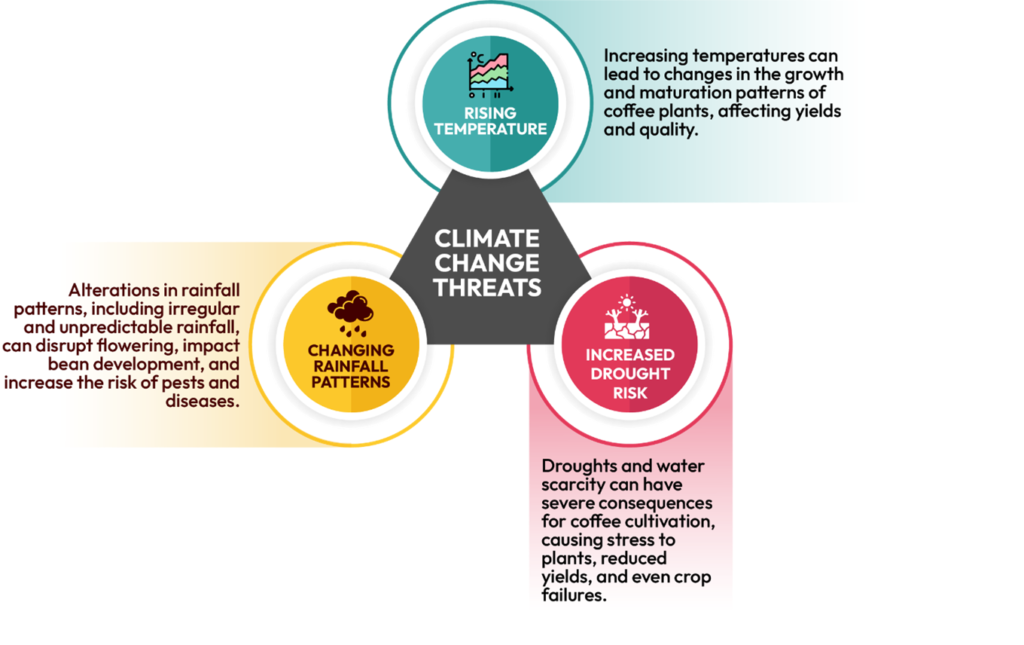Hey there, coffee enthusiasts! As the world wakes up to the significance of Environmental, Social, and Governance (ESG) factors, the Indian coffee industry is brewing up a storm with its focus on sustainable practices. In this article, we’ll dive into the exciting world of ESG initiatives and explore how it intersects with the Indian coffee industry. Get ready for some caffeinated knowledge on the latest updates and initiatives that drive sustainability in the coffee world!
Environmental Sustainability in Indian Coffee Production:
Let’s spill the beans on responsible farming techniques in the Indian coffee industry. The area under coffee cultivation in India has fluctuated over the years, with approximately 4,41,100 hectares in 2020. In terms of coffee production, India produced around 3,20,000 tonnes valued at Rs. 7,500 crores in 2020.
Rain-fed farming plays a crucial role in the production of Robusta and Arabica coffee, but climate change has been stirring things up, affecting crop yields. Here are three main climate change threats:

However, our innovative coffee superheroes in India are tackling this challenge head-on by investing in climate-resilient systems and processes. They’re going green with agroforestry practices by planting shade trees in coffee plantations. This initiative not only boosts coffee production but also promotes biodiversity, preserves soil quality, and creates a bustling habitat for wildlife. Talk about a win-win situation!
Coffee farmers in India are also embracing climate-smart farming techniques like water-efficient irrigation systems, reducing chemical usage, and optimizing resource utilization by exploring renewable energy options to power their coffee processing units. Not only are they reducing greenhouse gas emissions, but they’re also contributing to the overall sustainability of the coffee industry in India. Now that’s what we call a powerful brew!
Global Good Practices in the Coffee Industry:
Equator Coffee and Teas, a specialty coffee business, has implemented ESG reporting across its business model. They pay coffee farmers fair prices higher than the market rate, ensure sustainable coffee farms through eco-friendly practices, invest in training and education initiatives for farming communities, and contribute to a safe working environment for employees. ( https://www.equatorialtraders.com/ )
Starbucks also focuses on ESG initiatives, including investing in employees, caring for communities and the planet, and advancing equity and inclusion. They have released an ESG report that highlights their efforts in these areas. (https://www.starbucks.com/responsibility/reporting-hub/ )
It is interesting to see smaller specialty coffee businesses like Blue Bottle Coffee (https://blog.bluebottlecoffee.com/sustainability ) and Intelligentsia Coffee (https://www.intelligentsia.com/pages/our-approach ) stepping up their game. They not only serve delicious coffee but also take pride in their sustainability initiatives. They have set up annual ESG reporting and launched specialized certification programs for suppliers worldwide.
Speciality Coffee in India:
Araku Coffee is a brand that not only offers award-winning gourmet coffee but also has a profound impact on the local tribal community. Through their unique value chain, Araku Coffee empower marginalized tribal communities by turning them into entrepreneurs and coffee farmers. Implemented by the Naandi Foundation and supported by corporate donors, this initiative addresses afforestation through agroforestry initiatives in coffee plantations thus promoting sustainable livelihoods.
Araku Coffee also embraces regenerative agriculture practices, enriching the soil with organic compost and planting diverse trees for shade and extra income. They have collaborated with organizations to restore the local forest, planting millions of trees and fighting climate change. ( https://www.arakucoffee.in/learn-blog/sustainable-coffee-farming-is-the-key-to-a-better-future )
Tata Coffee’s Green Initiative:
Tata Coffee is committed to sustainability and adopting environmentally friendly practices through its remarkable Green Initiative. They have taken significant steps to reduce their carbon footprint, conserve water, and minimize the consumption of fossil fuels.
Tata Coffee’s Theni factory plant is leading the way in reducing carbon emissions by transitioning to renewable energy sources. About 81% of their energy consumption comes from wind and solar power. They have also implemented measures to tackle global water stress by utilizing recycled water, improving water recycling efficiency, and reducing total dissolved solids in cooling tower water. Tata Coffee is making responsible use of this precious resource.
Additionally, Tata Coffee is actively reducing its reliance on fossil fuels by substituting coal in their boilers with spent ground coffee and other waste generated from instant coffee processing. This not only decreases toxic gas emissions but also contributes to effective biomass waste management.
ESG reporting has become a critical tool for the Indian coffee industry to drive sustainability efforts. By measuring and reporting their environmental impact, social initiatives, and governance practices, coffee companies in India enhance transparency, accountability, and trust. By choosing companies that prioritize sustainability initiatives like these, we, as consumers, can make an informed choice. Together, we can promote and recognise responsible business practices. ( https://www.tatacoffee.com/blog-entry/green-initiative )
Conclusion:
By choosing companies that prioritize sustainability initiatives like these, we, as consumers, can make an informed choice. Together, we can promote responsible business practices. ESG reporting has become a critical tool for the Indian coffee industry to drive sustainability efforts. By measuring and reporting their environmental impact, social initiatives, and governance practices, coffee companies in India enhance transparency, accountability, and trust. The latest updates in ESG reporting showcase the ongoing commitment of Indian coffee producers to create a sustainable future.
Through collective efforts, the Indian coffee industry is leading the way in promoting environmental stewardship, social responsibility, and good governance.